Renault Megane E-Tech 2024 review: Mildly refreshed electric crossover certainly talks the talk, at least
Does it walk the walk, though?
Many moons ago, when the Renault Megane was a brand-new model in the French manufacturer’s range, it was advertised in the UK with a campaign centred on “it talks your language” — involving a young Tony Gardner (Last Tango in Halifax), presumably having something of an existential crisis as he dementedly chatted to the interior fascia of his small, vaguely sexist Gallic hatchback.
Times — and marketing techniques — haved moved on significantly since the mid-90s but we’re not sure precisely whose language the latest Megane is talking. After four generations of reasonably normal family-car fare from the Megane — well, the mad, bustle-backed Mk2 perhaps notwithstanding — the new, fifth-generation car has taken a complete leap of faith into the world of SUVified electric vehicles (EVs).
Skirting dangerously around the issue of lazy national stereotyping, this is such a French thing to do: build up a loyal following of customers who like a straightforward, conventional hatchback sold across nearly 30 years, and then make them adapt to a totally new idea with an electric variant.
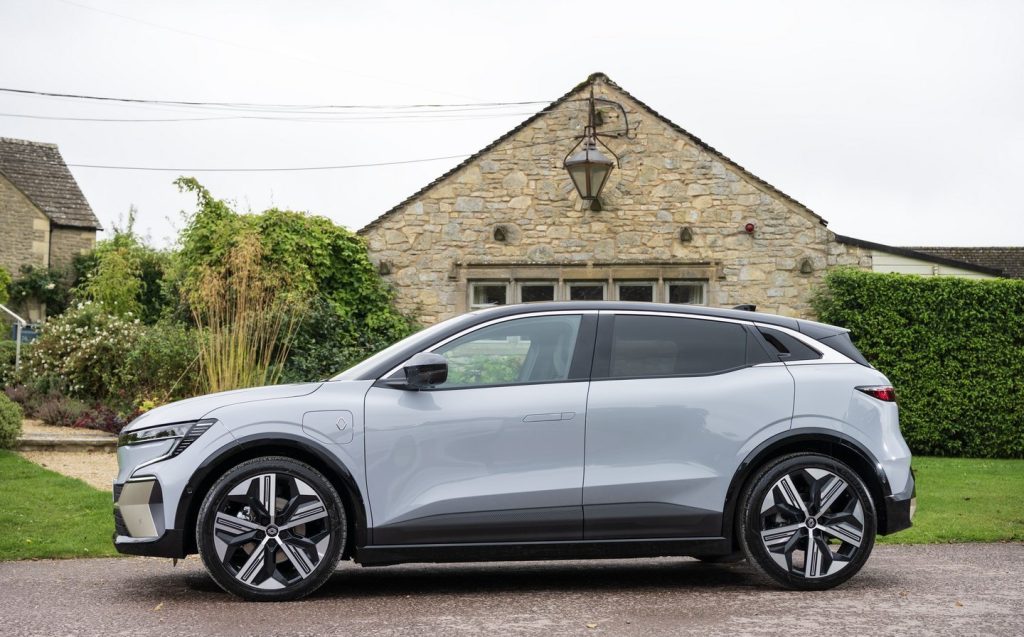
Yet it’s a successful transition on the Megane’s part. Primarily because of the way it looks — all concept car-like and handsome, being both chunky and somehow sleek too.
Its appearance is helped by the cartoonishly large 20in “Enos” alloy wheels shoved right into all four corners of its frame on the top-spec Iconic test model, although the base-grade car (of three trims available) makes do with more discreet 18s.
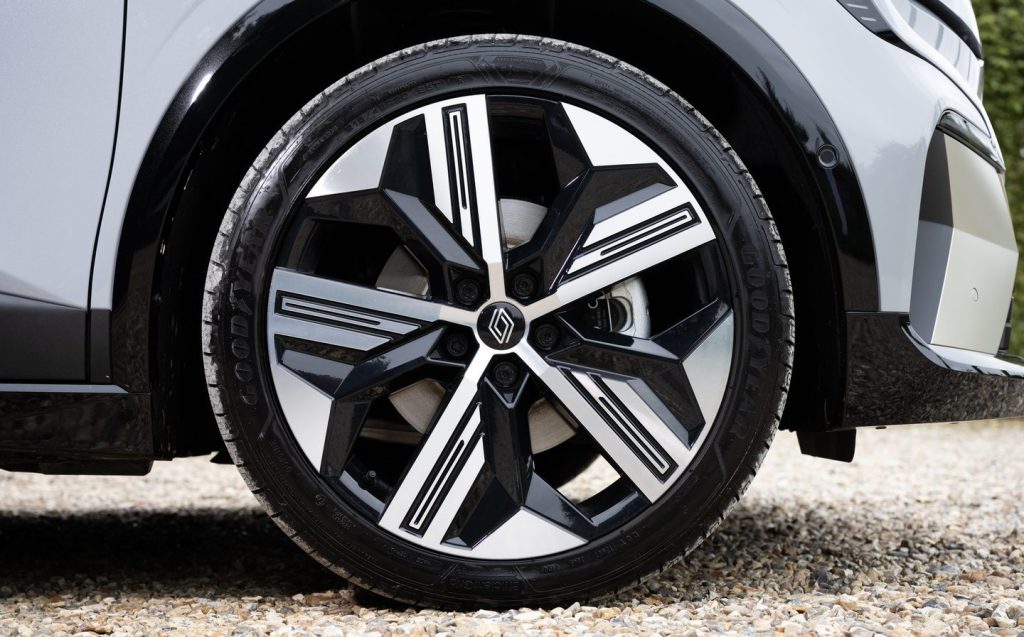
Visual changes for the 2025 model year only amount to higher-spec versions of the Megane gaining a light titanium-coloured “F1 Blade” in their front bumper design. But with its swoopy daytime running lamps, deep flanks and narrow glasshouse, the Megane is a fine-looking contrivance.
It’s not, though, much of a crossover in anyone’s language, despite the fact Renault would dearly like to position it as such.
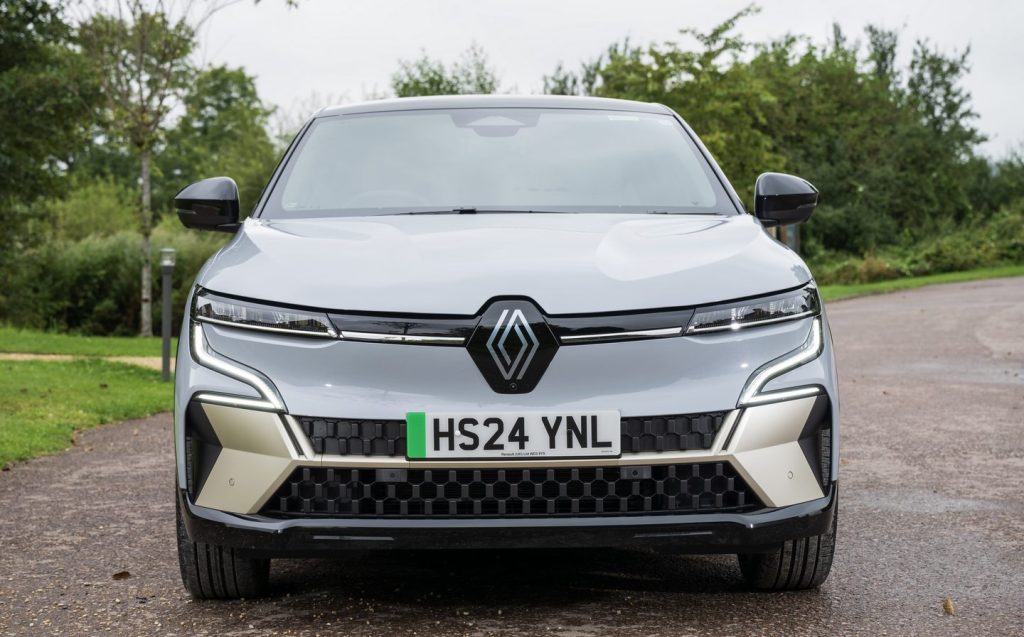
An overall height of 1,505mm might be on the taller side for a hatchback, which would normally be about 1.4 metres above the deck, but it doesn’t give the impression of being SUV-tall as you walk up to it, and it certainly doesn’t once you clamber aboard and settle yourself in behind the steering wheel. The driving position is most definitely car-like.
It’s a thoroughly high-quality cabin inside, though. Renault has a solid handle on material finishing right now, while the OpenR Link infotainment screen is enlarged to a 12in item on upper Techno and Iconic models; it remains as a 9in unit on the base Evolution car, though.
Those swanky new 12in units employ smart Google Services mapping and control systems, so the Renault – with its central portrait touchscreen forming one large dashboard construct with the clear, 12.3in digital driver’s cluster behind the wheel – has one of the better high-tech human-machine interfaces going.
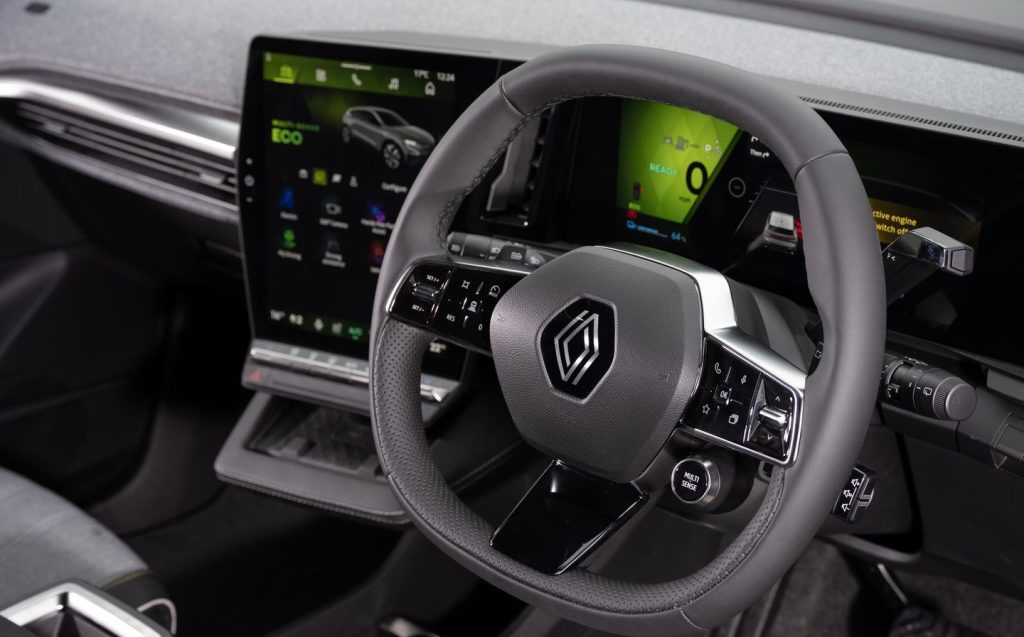
For the new car, the specification changes are minimal beyond the titanium exterior styling and the larger infotainment screen on the top two models.
Every Megane E-Tech is now fitted with a heat pump as standard, for instance, including the entry-level Evolution. This is something that can purportedly increase the effective electric range of the Megane EV by up to nine per cent in conditions below 10°C. Which is very helpful in the UK, let’s be honest.
Meanwhile, the grander Techno and Iconic cars have something called “contextual adaptive cruise control” — this simply means the Megane is aware it is approaching a roundabout, junction or sharp bend if you’ve got the cruise activated and will therefore slow itself accordingly — and there’s hands-free parking and a 12-speaker Harman Kardon uprated sound system in the Iconic flagship.
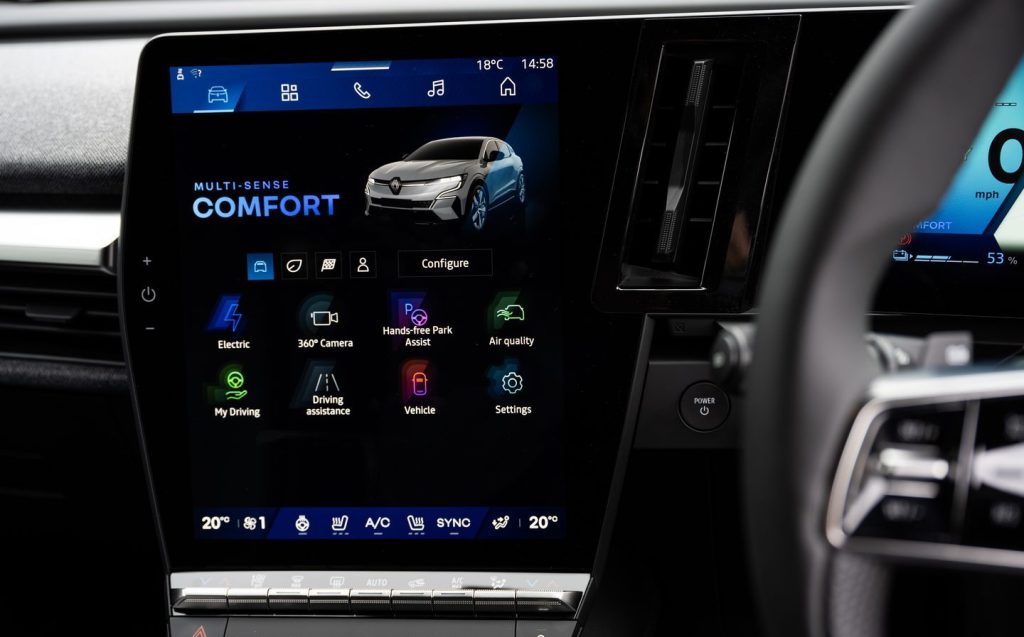
There’s obviously enough technology and know-how in the Megane in 2024 that you can talk to its dashboard if you must, using its voice control functions to activate various aspects of the car. But maybe that’s a bit too on-point for a bit of light Gardner mimicry.
Brilliantly, Renault says that efficiencies in the production process mean the overall price of each model of Megane E-Tech can be reduced by £500, despite all the extra gear fitted to updated cars. That really is talking the language most people need to hear in these financially conscious times.
Prices therefore start at £33,995, although a top-spec Iconic with metallic paint will be getting on for 40 grand, which does seem like a lot… but then again, you may have noticed all things have got fairly pricey in recent years.
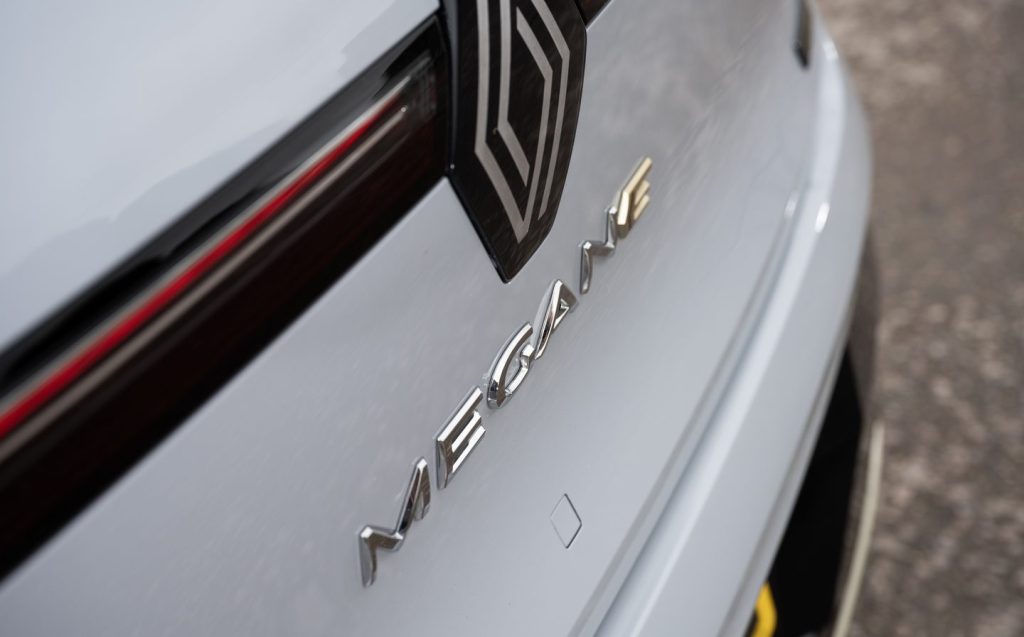
Otherwise, though, the Megane remains the same as it was when it launched in 2022. This means it has a 60kWh battery pack (that’s the usable energy content) and a single 160kW (214bhp) electric motor, giving it a theoretical range of up to 285 miles.
The bigger 20in wheels on this Iconic version reduce the official range to 281 miles, however, and as we all know with EVs by now, real-world driving and weather conditions means that achieving even that distance between charging sessions is likely to be difficult.
And it’s that modest real-world range of about 220(ish) miles which holds the Megane back from being a far easier machine to wholeheartedly recommend. When cars such as the new Kia EV3 can go up to 372 miles (officially) for £35,995, the Renault’s capabilities look a bit too modest.
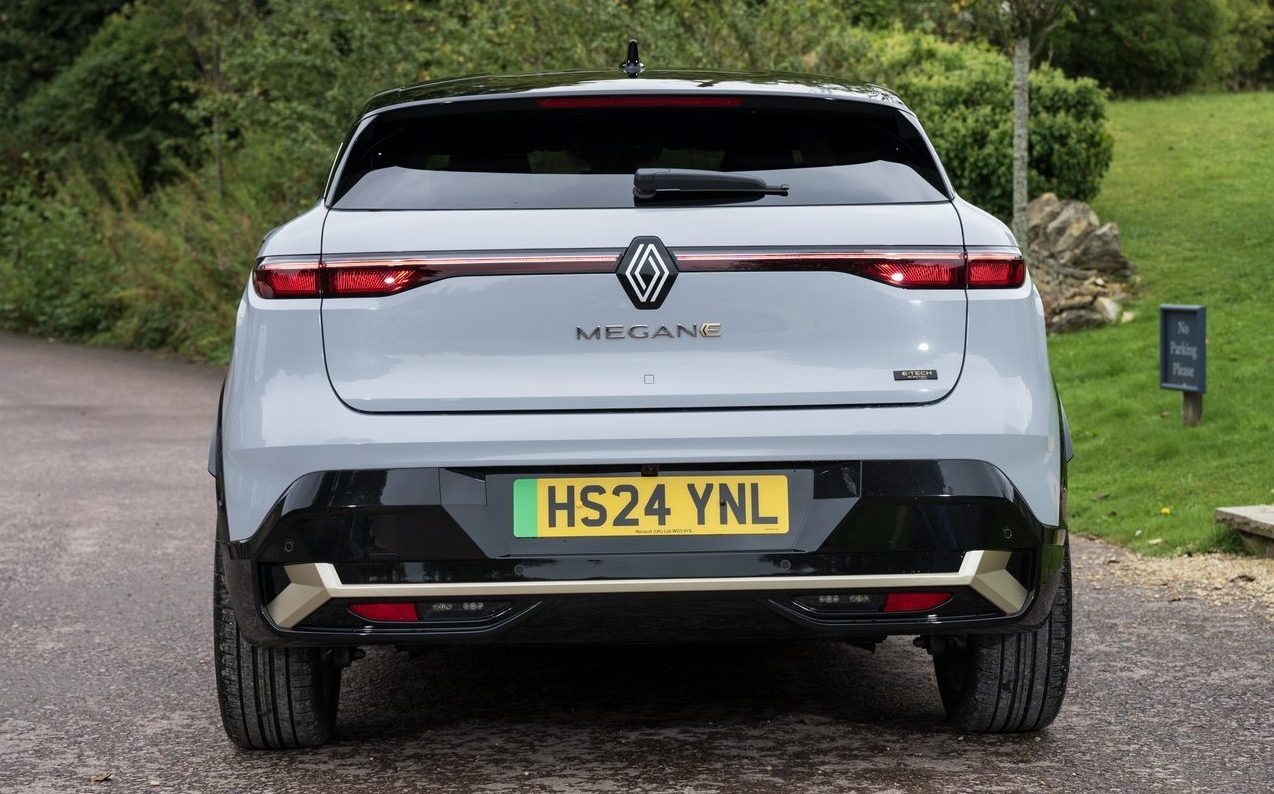
It could’ve done with having its 60kWh battery enlarged for this round of updates, to match the EV3’s 81.4kWh pack, although that would have then scuppered its reasonable weight of about 1.7 tonnes in running order.
That means the Renault isn’t ridiculously heavy for an EV in its class, and that means it not a bad car to drive. Far from it, in fact. But by the same token it’s not particularly memorable. As part of these manufacturer test drives we often pair up with another journalist and after a very pleasant hour chatting to each other as we ambled about the Cotswolds in the new Megane, we realised we hadn’t taken in much about the car at all.
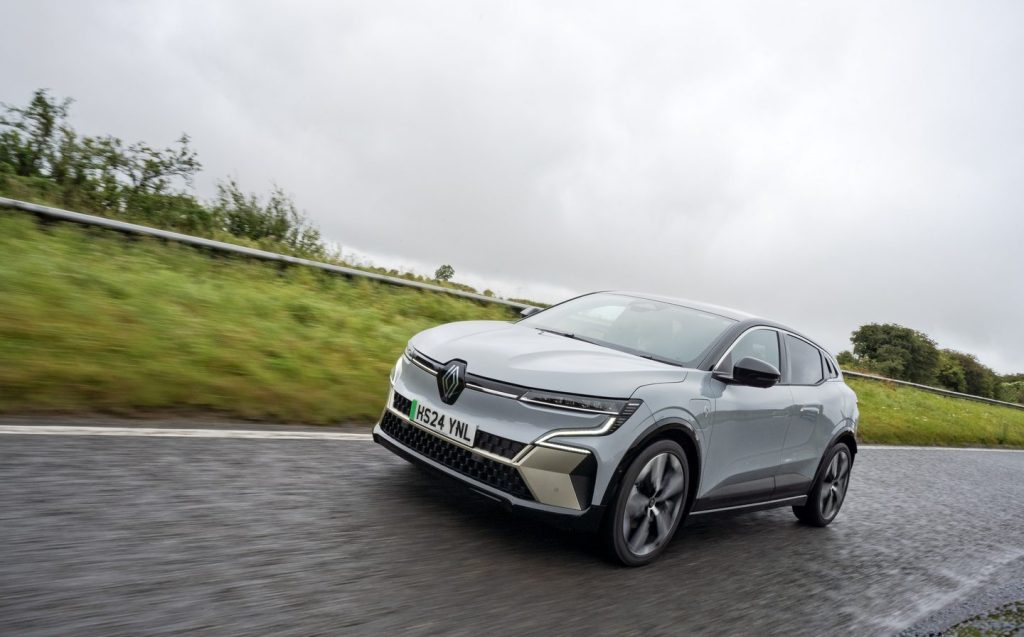
Partly this is because all the extra equipment fitted makes no difference at all to the way the Megane E-Tech drives, save for it being a little more long-legged in cold weather. But as we sampled it on a mild early-autumn day, we can’t attest to the veracity of that claim one way or the other.
Of course, this unimposing driving manner is, on the one hand, a positive for the Renault. It always rides smoothly and with good grace, despite those large alloys sitting in its arches.
The excellent calibration of its drivetrain and the silkiness of its power delivery also make it a reasonably swift yet entirely genial car to pop quickly out of junctions in. Its regenerative braking levels are suitably well-judged, too.
And the comfortable cabin is majestic in terms of its acoustic isolation, so — along with the lack of noise of an internal combustion engine — you can have a very dignified conversation inside the Megane E-Tech (but not with the car, clearly; with your human passenger instead, Tony) even when you’re travelling at motorway speeds.
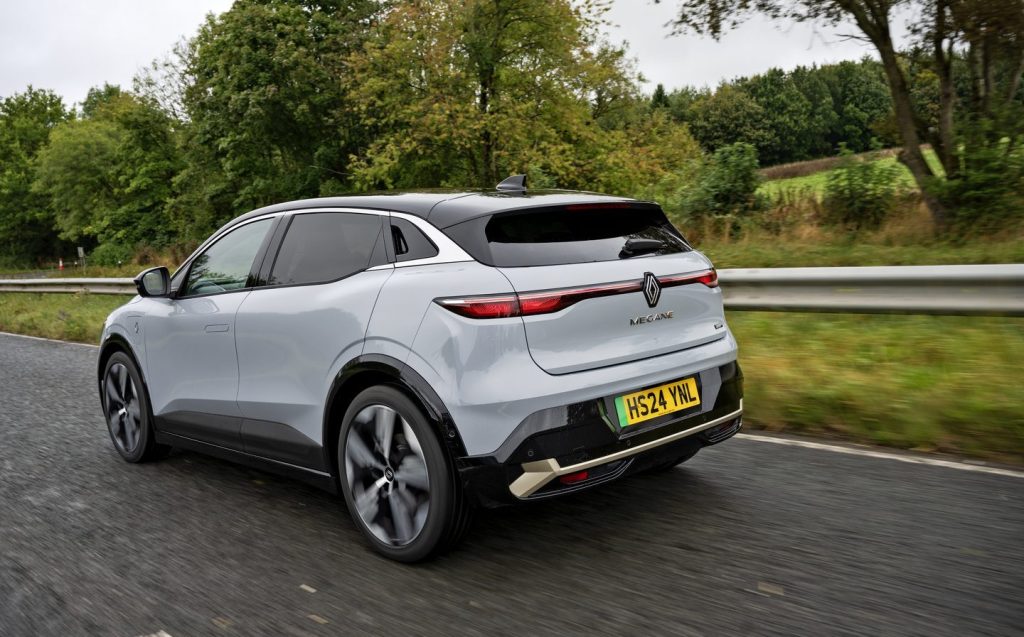
It’s all very easy-going. Yet, if you’re looking to construe that as a negative, it’s not particularly memorable either.
Surely part of the reason for keeping the Megane EV vaguely hatchback-shaped and not just turning it into yet another crossover-SUV — as Renault itself did with the Scenic very recently — is that lighter, nimbler cars are more enjoyable to drive than high-riding, heavy 4x4s.
Not the Megane E-Tech. It’s not particularly sharp in the corners and the lightweight steering lets the driver know precious little about what either the front wheels or the chassis are up to.
Then there’s the practicality. As hatchbacks go, the electric Megane is not bad. Rear-seat space is generous enough, and the boot’s OK with a minimum of 440 litres at your disposal with all chairs in use, plus 32 litres of underfloor storage in the boot, which beats the 2019 Megane hatch (434 litres). But electric SUVs of a similar class give you plenty more to play with.
Also, the Megane’s concept-car exterior styling results in a rear windscreen which feels letterbox-thin to look through via the interior mirror.
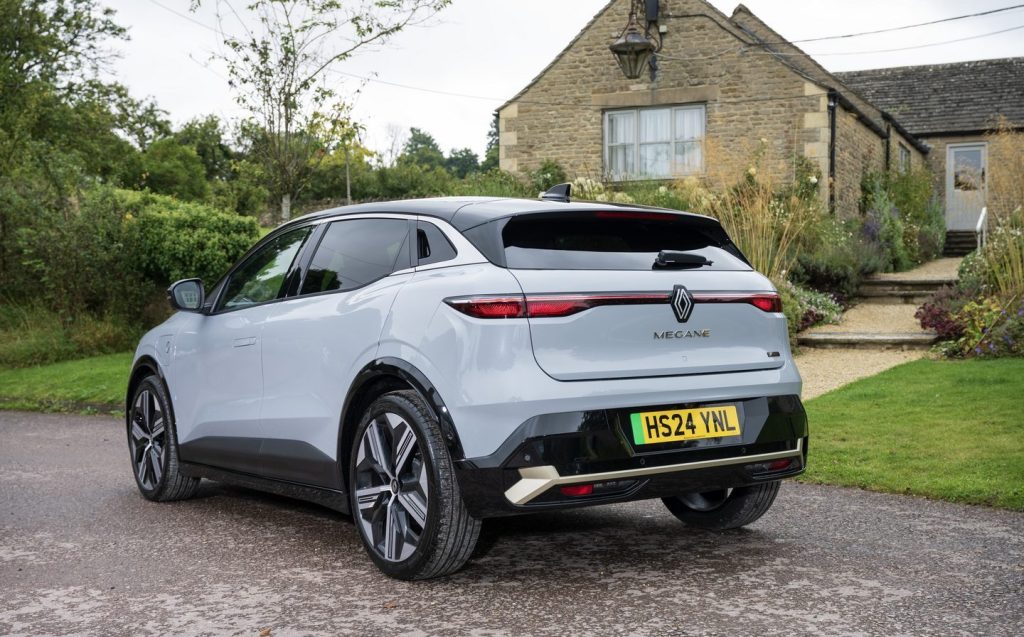
All of which adds up to an undoubtedly talented car but one which, nevertheless, we’re not sure who precisely it is talking to — unless Tony G is up for another advertising campaign 30 years down the line?
The Megane E-Tech is a highly pleasant, well-executed electric hatchback and one which has had a modest yet worthwhile series of tech updates for the 2025 model year. But we can’t help feeling that with its sub-300-mile official range and lower seating position, most people making the transition to EVs will simply default to one of the many electric SUVs instead. Probably even Renault’s own, and excellent, Scenic E-Tech.
Oh well, Megane, looks like it’s just you and us then. What’s that? No, you can’t say that these days…
Related articles
- If you found this review of the updated Megane interesting, you may want to read about the rather more interesting new, all-electric Renault 5
- Also take a look at our review of the Renault Scenic 2024
- Looking for other options? Here are the top 10 longest-range electric cars
Latest articles
- Denza Z9GT 2025 review: Flawed but sleek 1,062bhp shooting brake from BYD’s luxury arm
- Extended test: 2024 Renault Scenic E-Tech review
- Best-selling cars 2025: The UK’s ten most popular models of the year so far
- Audi A6 Avant 2025 review: Trusty executive estate ticks expected boxes, and there’s still a diesel option
- Keir Starmer eases pressure on carmakers to sell EVs in response to ‘global economic headwinds’
- F1 2025 calendar and race reports: The new Formula One season as it happens
- Ferrari 12Cilindri Spider review: Heady blend of traditional and futuristic becomes even more intoxicating after lid is removed
- Skoda reveals its fastest accelerating production car yet: the electric Elroq vRS
- Carmakers fined £461m in UK and Europe for not competing over vehicle recycling














